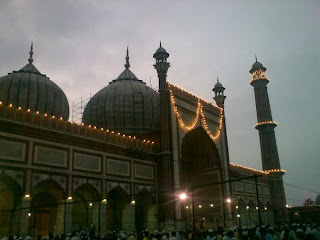




Yesterday (12th September, 2009) the “Delhi Bloggers Bloc” (DBB) had its 31st meet at the Jama Masjid of Old Delhi, followed by a solid meal at the “Al-Jawahar” restaurant in that area itself. And wow, what an experience it was!
We, the DBB members were also accompanied by the members of “Eating Out In Delhi” (EOID) – a group that visits or revisits various Delhi restaurants about twice a month, to “experience Delhi's offbeat eating joints, which are low on pretension and high on value for money and dining experience”.
Apart from the meet, last day’s evening will be memorable for me for other reasons, as well. Yesterday was the first day that I visited Jama Masjid. And yesterday was also the first day that I commuted Delhi Metro, after spending 8 years in Delhi.
I was picked up from a spot near “Prakash Hospital” – around 15 minutes walk from my home at Sector 22 of Noida – by my fellow DBB member Sachin Khosla, an energetic and lively Punjab da Puttar from Ludhiana (you talk to him for 2 minutes, and you will feel you know him for 2 years). Sachin, an IT professional, stays at Indirapuram at Ghaziabad, and said that he would pass that way, and could give me a lift. He was also having with him his friend Varun, another Punjab da Puttar (from Pathankot) and an IT professional as well.
We went to Yamuna Bank metro station, where we parked our car, and boarded the Delhi Metro (first time in my life) for the Rajiv Chowk (i.e. Connaught Place) station. The queue in front of the ticket counter, entering the platform, boarding the train, the electronic announcements, everything reminded me of the Metro Rail of my dear hometown Calcutta, and I realized that I was missing the Calcutta Metro Rail. However, the Delhi Metro is also great.
After reaching Rajiv Chowk station we had to change the train. As Sachin explained to me, we were changing from Blue Line to Yellow Line (I did not get it though). Now that train took us straight to Chawari Bazaar station, i.e. the station of Jama Masjid. We came out of the station to be welcomed by the unique ambience of Old Delhi, and stepped on the narrow lane that would take us to Jama Masjid. It was in front of the Jama Masjid that we were supposed to meet other members of our group.
God, I will never forget that short journey on that lane. It was so narrow, and yet so congested. There were two-wheelers, rickshaws, and of course people, and so on. I do not remember whether I noticed any car or auto, but the two-wheelers and rickshaws were enough to make that lane “jam-packed” and crowded. Only I know how “athletic” we had to be to move forward, without having any collision with anybody, whether rickshaws, two-wheelers or human beings.
Well, at last we reached the famous Jama Masjid, one of the landmarks of Old Delhi (rather Delhi as a whole). Our co-ordinator Priyanka Sachar (more famous as Twilight Fairy in the blogging circle) was already there, along with Sanjay, Manish, Sandip, etc. There were also two journalists from Indian Expres, including photojournalist Tashi Tobgyal, whom I later found to be a very interesting person with a bagful of interesting experiences. After some “Hello”/”High” we entered the Jama Masjid.
Entering into the Jama Masjid itself was a thrilling experience for me. It was the first time that I stepped inside a mosque, and at the very first time I entered India’s largest mosque, the one that I have read and heard so much about. And the thrill and pleasure got enhanced by the beautiful environment that I encountered there.
The first thing that impressed me was the beautifully constructed red-stone body of the shrine. If I am not wrong, I found some architectural similarity between Jama Masjid and Red Fort (I may be wrong). It was around 6 pm, and all the pious Muslim ladies and gentlemen had already assembled there for the evening prayer, which was to be followed by the meal to break the fast. There were nice lighting arrangements, which made the mosque look more beautiful and gorgeous. We all were chatting and relishing the grand architecture of the mosque – its dome, pillars, etc, while a few of us like Manish and Sanjay were constantly taking snaps.
I was chatting with Abdus Salam, a new DBB member whom I had just met, when we heard the sound of Azan. Immediately all the people sat down to offer prayers. Hitherto I had seen such scenes only in TV, movies, newspapers and magazines. It was the first time that I found so many Muslims offering prayers together (after all, it was my first visit to a mosque). And they were looking so nice. They were so disciplined. I loved the reflection of devotion on their faces.
After some time we left the mosque, and again set foot on the narrow lanes to go to “Al-Jawahar” restaurant in that locality, where the EOID gang members were waiting for us. We entered the restaurant that was filled up with the thrilling aroma of spicy Muslim dishes, and went upstairs to find the huge and sprightly EOID gang (led by Hemangshu) enjoying their meal.
Very soon we joined them, and were welcomed by a plethora of dishes, like Tanduri Chicken, Chicken Stew, Pakoda, soft drinks (Coke and Pepsi), etc. The ultra-enjoyable meal was spiced up by lively chats, with each of us making a new friend at every minute. In fact, it was probably the first time that I found myself with such a huge group, occupying such a huge portion of a restaurant.
I just do not know how 2 hrs passed. Then came the time to leave. However, there were many who accompanied us till the Metro Station, boarded the train, and came with us till the Rajiv Chowk station. And we made full utilization of the opportunity by retaining our chatting with full gusto, leaving all the co-passengers staring at us in the same manner the people at the restaurant did.
After reaching Rajiv Chowk we found that now it would be again only three of us – Sachin, Varun and myself, who would be going to Yamuna Bank station, while others who were accompanying us would take different routes. I was very busy in saying “bye” to Sandip and other people, only to realize that Sachin and Varun had already boarded the train to Yamuna bank (soooooooo bad!). Actually they did notice that I had not boarded the train with them. Anyways, I called up Sachin, and he said he would be waiting for me at the Yamuna Bank station. So I boarded the next train to Yamuna bank station, and went to Yamuna Bank, and that also became my first experience of traveling alone in Delhi Metro.
At Yamuna Bank Sachin and Varun were waiting for me. We boarded Sachin’s car, and he again dropped me near my home. And I came back home with a refreshed mind.
Thanks a lot for the fun-filled evening, DBB. I will always cherish the memory of this experience.
A special thanks to the EOID group, as well. The evening would not have been so much enjoyable but for their presence. And I liked them so much, and I found the concept of eating out at various Delhi restaurants to be so innovative. The concept of EOID exemplifies how small concepts can make our life much more enjoyable.
Photo Courtesy - Sachin Khosla (www.digimantra.com)









